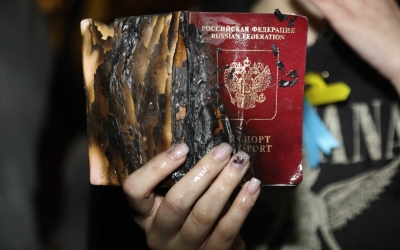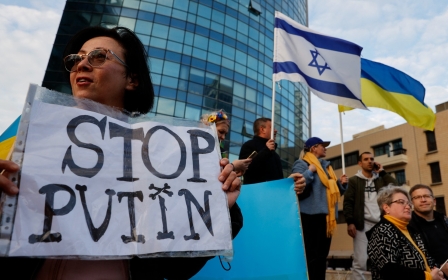Russia-Ukraine war: Israeli government 'urged to stay neutral' by army leaders

Senior army commanders in Israel are pushing the policy of neutrality in the Russia-Ukraine conflict, news outlet Ynet reported on Friday.
Prime Minister Naftali Bennett was advised to pursue a cautious policy and appear as a peacemaker in the crisis, as he walks a thin line between allies in Washington and Moscow.
Unlike the US and EU countries, Israel has not imposed sanctions on Russia's financial organisations or individuals in the aftermath of Moscow's invasion of Ukraine last week.
According to Ynet, army commanders told Bennett's government "not to publicly attack the Russians," and pursue "a balanced, responsible and realistic policy in the face of military challenges" in Syria and Iran.
Since Moscow launched its invasion on 24 February, Israeli politicians have refrained from criticising Russia, keeping a low profile and maintaining diplomatic stoicism.
New MEE newsletter: Jerusalem Dispatch
Sign up to get the latest insights and analysis on Israel-Palestine, alongside Turkey Unpacked and other MEE newsletters
Israel abstained in a recent UN Security Council vote on the conflict, although it supported a UN General Assembly resolution condemning the Russian invasion on 28 February.
Israel's modus operandi regarding the Russian-Ukrainian war is that although the US is an ally for Israel, Russia is a neighbour on the northern borders with Syria, where Tel Aviv sees Iranian-backed fighters as a threat.
In 2015, Russia's military intervention in Syria was vital for Bashar al-Assad's government which had lost several provinces to rebel fighters during the civil war.
Since then, Russia has established naval and air stations on the Syrian coast, mainly the port of Latakia and Hmeimim airbase.
Israel's goal is to maintain security coordination with Russia in Syria, according to Ynet.
Russia's surface-to-air missile systems, S-300 and S-400, have not been operated in Syria and government forces have not been allowed to use them. Israel wants to maintain the status quo to keep the upper hand in striking targets in Syria.
On Thursday, Kenneth McKenzie, the head of the United States Central Command (Centcom) visited Israel and met with Aviv Kochavi, the Israeli army chief of staff.
Both parties discussed "the ongoing cooperation between the militaries, maintaining regional stability and operational cooperation," the Israeli army said in a statement.
Minister of Defence Benny Gantz told McKenzie on Thursday that "Israel will continue to be committed to the excellent relationship between the US and Israeli armies and to deepening relations," according to Ynet.
Middle East Eye delivers independent and unrivalled coverage and analysis of the Middle East, North Africa and beyond. To learn more about republishing this content and the associated fees, please fill out this form. More about MEE can be found here.





